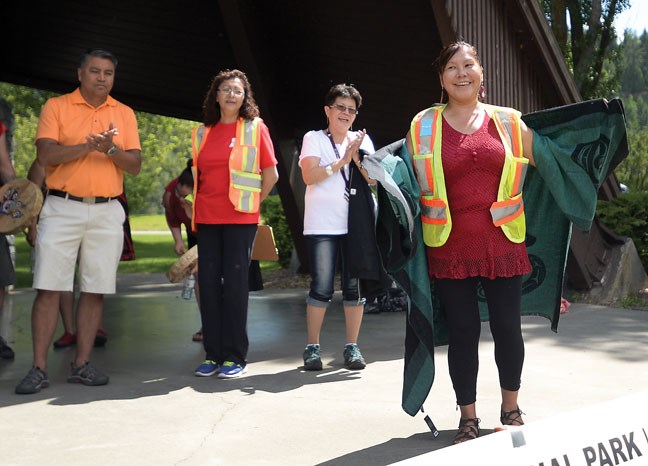Brenda Wilson-John took the last few steps of her 700-kilometre journey onto the stage at Lheidli T'enneh Memorial Park Tuesday to a song written in her honour.
"We are cleansing the highway of tears," sang Kym Gouchie. "As we walk, as we walk."
Palms up, Wilson-John sang to the beat of the Khast'an Drummers, the neon yellow of her vest bright like her smile. National Aboriginal Day marked the ceremonial end of her walk from Prince Rupert to Prince George in honour of her murdered sister's memory and others lost along the Highway of Tears.
Ten years ago, another family walked the same route in honour of another lost daughter - Tamara Chipman. The choice to travel that specific stretch by foot has symbolic meaning, said Wilson-John, who started her trek on June 1.
"It's reiterating the fact that we should be able to walk freely anywhere on our highways and we shouldn't feel fear. We shouldn't be afraid of being abducted or violated. We should be able to walk freely on our roads and within our communities," said Wilson-John.
Silence still surrounds many of those lost, she added. She understands the acute grief of many she met in communities along the way - communities that feel forgotten - but she tried to encourage them to give that grief a name and a voice.
"Talk about them like they're sitting right beside you," said Wilson-John, who wore her sister's likeness on earrings. Red-beads frame a faded picture of Ramona Wilson, just 16 when she disappeared 22 years ago. She's in a traditional wedding dress, holding a fan of three eagle feathers.
"I didn't want her to be known as another face on a poster," said Wilson-John, whose sister is among the 18 women murdered or missing along Highway 16 and adjacent routes since the 1970s.
Last week the province said it would establish a bus service between 16 communities along Highway 16 by the end of the year.
"I'm skeptical. I want to be able to see it in action," before she offers judgment, she said.
Wilson-John inspired this year's theme of honouring women for Aboriginal Day, said Tasheena Seymour.
"That way we could really celebrate her and everything she's done to bring awareness to missing and murdered indigenous women," said Seymour.
After four years with the organizing committee, Seymour says working to celebrate the day has grown to include 23 indigenous organizations.
When the group started, the focus was simple: to celebrate diversity.
"It's what we've arrived for every year," said Seymour, a family development assistant with Lheidli T'enneh.
This year School District 57's aboriginal education department was at the table too and paid to bus students to the park.
All but two schools sent students, who sat in circles on the lawn and even joined in with some performances.
Carrier Sekani tribal chief Terry Teegee said celebrating aboriginal day signifies a transition in seasons but also in historically challenging relations.
"There's a real opportunity to restructure and realize our relationship as indigenous people with the settler community isn't that great," Teegee said. "We should be building relationships. That's what truth and reconciliation are all about."
Wilson-John finishes her journey with a dance:
Wilson-John finishes her journey with a dance pic.twitter.com/vsgbBiODDg
— Samantha WrightAllen (@samanthawrights) June 21, 2016



